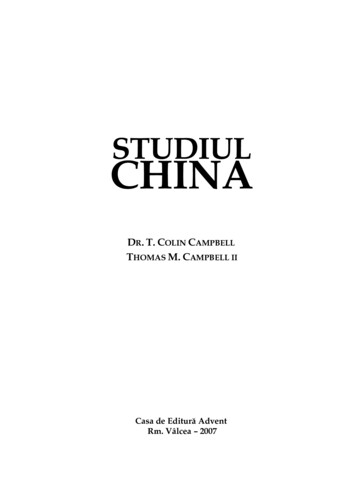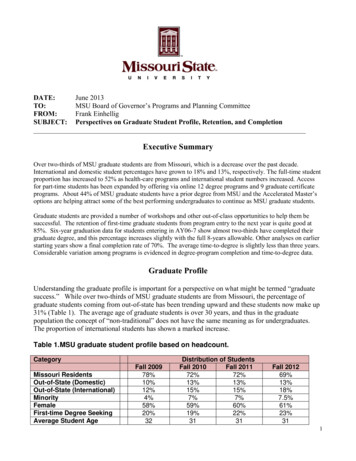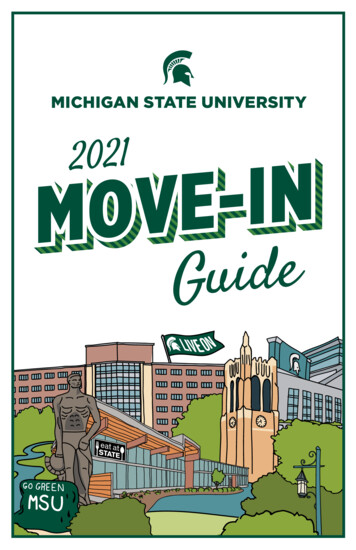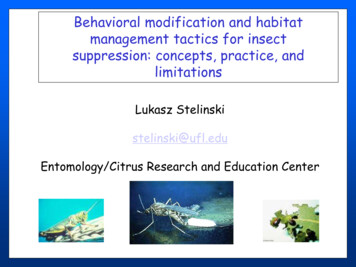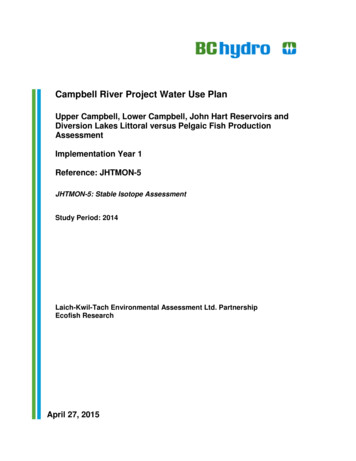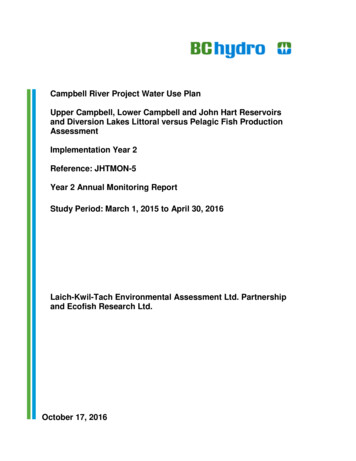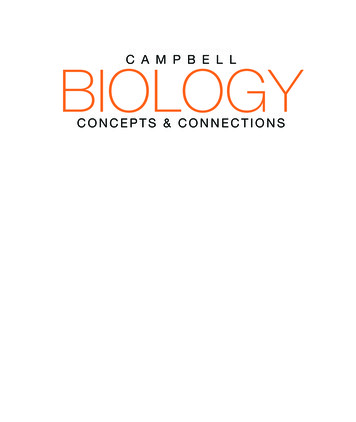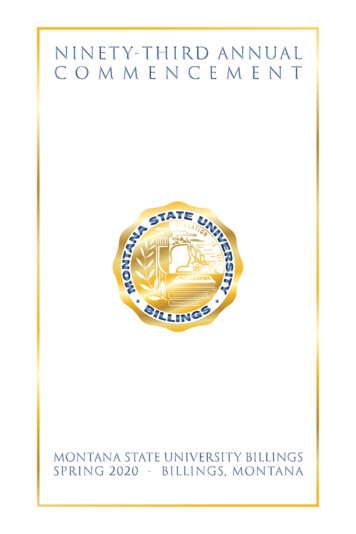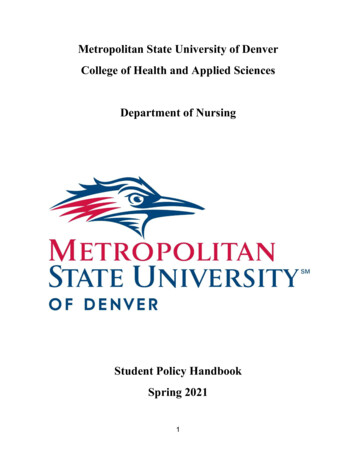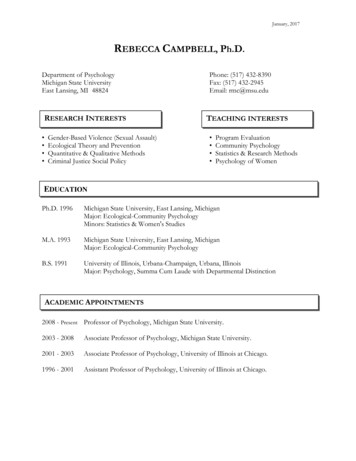
Transcription
January, 2017REBECCA CAMPBELL, Ph.D.Department of PsychologyMichigan State UniversityEast Lansing, MI 48824RESEARCH INTERESTS Gender-Based Violence (Sexual Assault)Ecological Theory and PreventionQuantitative & Qualitative MethodsCriminal Justice Social PolicyPhone: (517) 432-8390Fax: (517) 432-2945Email: rmc@msu.eduTEACHING INTERESTS Program EvaluationCommunity PsychologyStatistics & Research MethodsPsychology of WomenEDUCATIONPh.D. 1996Michigan State University, East Lansing, MichiganMajor: Ecological-Community PsychologyMinors: Statistics & Women's StudiesM.A. 1993Michigan State University, East Lansing, MichiganMajor: Ecological-Community PsychologyB.S. 1991University of Illinois, Urbana-Champaign, Urbana, IllinoisMajor: Psychology, Summa Cum Laude with Departmental DistinctionACADEMIC APPOINTMENTS2008 - Present Professor of Psychology, Michigan State University.2003 - 2008Associate Professor of Psychology, Michigan State University.2001 - 2003Associate Professor of Psychology, University of Illinois at Chicago.1996 - 2001Assistant Professor of Psychology, University of Illinois at Chicago.
2RESEARCH AWARDS2017Community Engagement Scholarship Award for The Detroit Sexual Assault Kit(SAK) Action Research Project, Michigan State University.2017Distinguished Partnership for Community-Engaged Research Award, with the WayneCounty Prosecutor’s Office, Michigan State University (Inaugural Recipient).2015Vision 21 Crime Victims Research Award, Office for Victims of Crime, Office ofJustice Programs, U.S. Department of Justice (Inaugural Recipient).2015Special Contributions to Public Policy Award, Society for Community Research &Action (Division 27), American Psychological Association.2014William J. Beal Distinguished Faculty Award, Michigan State University.2013Outstanding Evaluation Award, American Evaluation Association: Implementation ofa Sexual Assault Nurse Examiner (SANE) Practitioner Evaluation Toolkit, NationalInstitute of Justice Award, 2009-MU-MU-0002.2010Ann Burgess Nursing Research Award, International Association of Forensic Nurses(Inaugural Recipient).2008Distinguished Contributions to Psychology in the Public Interest Award(Early Career), American Psychological Association.2008Fellow, Society for the Psychology of Women, Division 35 of the AmericanPsychological Association.2006Scientific Achievement Award for Distinguished Contribution to the Science ofForensic Nursing, International Association of Forensic Nurses.2006Excellence Award in Interdisciplinary Scholarship, Phi Kappa Phi, Michigan StateUniversity (award with Cris Sullivan, Lori Post, Chris Maxwell, Celia Wills).2005Pediatric Research Loan Repayment Award, National Institutes of Health.2004Fellow, Society for Community Research and Action, Division 27 of the AmericanPsychological Association.2002Emerging Leader for Women in Psychology Award from the Committee on Womenin Psychology, American Psychological Association.2002Distinguished Publication Award for Emotionally Involved: The Impact of Researching Rape(Authored Book), Association for Women in Psychology.
32000Louise Kidder Early Career Award, Society for the Psychological Study of SocialIssues, Division 9 of the American Psychological Association.1998Faculty Scholar Fellowship, Great Cities Institute, University of Illinois at Chicago.1997Dissertation Award (First Place), Society for Community Research and Action,Division 27 of the American Psychological Association.TEACHING & SERVICE AWARDS2016Visionary Award for Leadership in Ending Violence Against Women (Career Award),End Violence Against Women International.2015The Wave of Change Award for Social and Systems Change (Detroit Sexual AssaultKit Action Research Project), Michigan Coalition to End Domestic & SexualViolence.2015Outstanding Educator Award, Council of Educational Programs, Society forCommunity Research & Action (Division 27), American Psychological Association.2009College of Social Science Alumni Association Outstanding Teaching Award, MichiganState University.2009Excellence in Service 10th Anniversary Award, Turning Point Forensic NurseExaminer Program, Mount Clemens, MI.2009Women of Honor Award, Outstanding Commitment to Ending Sexual ViolenceAgainst Women, Turning Point Inc., Mount Clemens, MI.2009Teal Ribbon Award, Outstanding Leadership for the Prevention of Sexual Violence,Michigan State University.2008Teacher of Year, Department of Psychology, Michigan State University.2008Outstanding Commitment and Collaboration Recognition Award, Capital Area SexualAssault Response Team (CASART), Lansing, Michigan.2001Finalist, Silver Circle Excellence in Undergraduate Teaching Award, University ofIllinois at Chicago.2000Teaching Recognition Program Award, Council for Excellence in Teaching andLearning (CETL), University of Illinois at Chicago.1999Finalist, Silver Circle Excellence in Undergraduate Teaching Award, University ofIllinois at Chicago.
4GRANTS & CONTRACTSCurrent Grants & Contracts:20212015PI: RTI International; Co-I: Campbell—The Sexual Assault Kit Initiative (SAKI),Training & Technical Assistance Project. Grant awarded by the Bureau of JusticeAssistance, 11,000,000.20182017PI: Campbell—The Michigan Sexual Assault Kit Initiative (SAKI) Project.Grant awarded by the Bureau of Justice Assistance, 300,000.20172015PI: Campbell— Serial Sexual Assaults: A Longitudinal Examination of OffendingPatterns Using DNA Evidence. Grant awarded by the National Institute of Justice(2014-NE-BX-0006), 699,533.20172014PI: Kubiak (MSU, Social Work); Co-I: Campbell—Using an Ecological Frameworkto Examine Reporting of Abuse During Incarceration. Grant awarded by theNational Science Foundation, 359,073.Past Grants & Contracts:20152011PI: Wayne County Prosecutor’s Office; Evaluator: Campbell—The Detroit SexualAssault Kit (SAK) Action Research Project. Grant awarded by the National Instituteof Justice (2011-DN-BX-0001), 1,515,000.20132010PI: Campbell—Sexual Assault Response Team (SART) Implementation andCollaborative Process. Grant awarded by the National Institute of Justice (2010-WGBX-0010), 278,713.20132007PI: Sullivan (MSU, Psychology); Co-PI: Campbell—Developing a Violence AgainstWomen Research Infrastructure in a Field Setting. Grant awarded by the NationalInstitute of Mental Health (R24), 2,864,285.20132010PI: Campbell—Implementation of a Sexual Assault Nurse Examiner (SANE)Practitioner Evaluation Toolkit. Grant awarded by the National Institute of Justice(2009-MU-MU-0002), 413,467. Winner of the 2013 Outstanding Evaluation Award,American Evaluation Association.20122008PI: Campbell—Sexual Assault Resource Analysis (SARA) for Medical ForensicExams Policy & Practice. Contract awarded by the Michigan Department ofCommunity Health, 1,051,673.20112007PI: Campbell—Adolescent Sexual Assault Victims’ Experiences with SANESARTs and the Criminal Justice System. Grant awarded by the National Institute ofJustice (2007-WG-BX-0012), 319, 921.
520092007PI: Campbell—Adolescent Sexual Assault Victims’ Help-Seeking. Grant awardedby Michigan State University Families and Communities Together Coalition, 50,00020092006PI: Campbell—A Systems Change Analysis of SANE Programs: Identifying theMediating Mechanisms of Criminal Justice System Impact. Grant awarded by theNational Institute of Justice (2005-WG-BX-0003), 389,925.20092006PI: Sullivan (MSU, Psychology); Co-I: Campbell—Violence Against WomenResearch Center Initiative. Grant awarded by Michigan State University,Office of the Vice President for Research and Graduate Studies, 548,879.20092006PI: Campbell—Evaluation of the National SANE Program Sustainability Project.Contract awarded by the National Sexual Violence Resource Center, 40,000.20072006PI: Campbell—Developing the Evaluation Capacity for Rape PreventionEducation Grantee Programs in the United States. Contract awarded by the Centersfor Disease Control and Prevention, 170,000.20072006PI: Campbell—Evaluation of the National Sexual Assault Response Team (SART)Toolkit. Contract awarded by the National Sexual Violence Resource Center, 22,000.20062005PI: Campbell—The Role of Forensic Medical and DNA Evidence in Child SexualAbuse Cases. Grant awarded by Michigan State University, Multi-DisciplinaryIncubator Grant Program, 75,000.20052004PI: Teitelman (MSU, Nursing); Co-I: Campbell—Development of an EvidenceBased Family Intervention to Reduce Risk of Unintended Pregnancy and SexuallyTransmitted Diseases among Adolescent Females on Medicaid. Grant awarded byMichigan Department of Community Health, 238,354.20032002PI: Campbell—Evaluation of School-Based Rape Prevention Programs andPreventive Community Initiatives. Contract awarded by the Centers for DiseaseControl and Prevention/Michigan Department of Community Health, 150,000.20021997PI: Campbell—Sexual Assault and Rape Prevention Evaluation. Contract awardedby the Centers for Disease Control and Prevention, 1,340,396.20021998PI: Riger (UIC, Psychology); Co-I: Campbell—Evaluating Domestic Violence andSexual Assault Services in Illinois. Contract awarded by the Illinois Department ofHuman Services, 1,100,000.19991998PI: Campbell—Rape Victims’ Experiences Seeking Community-Based Services.Grant awarded by the National Institute of Mental Health (NIMH), Program forMental Health Services Research on Women and Gender (R03), 33,807.19981997PI: Campbell—Training Mental Health Professionals on Violence Against Women.Grant awarded by the University of Illinois at Chicago, Campus Research Board, 15,000.
6PUBLICATIONSunderlined current student co-author; italics community partner co-authorSummary Bibliometrics:Web of Science Metrics: Number of times works cited 1,560; h-index 23Google Scholar Metrics: Number of times works cited 6,860; h-index 43Authored Books:Campbell, R. (2002). Emotionally involved: The impact of researching rape. New York: Routledge.Winner of the 2002 Distinguished Publication Award from the Association for Women inPsychology.Riger, S., Bennett, L., Wasco, S.M., Frohmann, L., Schewe, P., Camacho, J., & Campbell, R. (2002).Evaluating services for survivors of domestic violence and sexual assault. Thousand Oaks, CA: Sage.Special Issues of Peer-Reviewed Journals:Campbell, R., & Morris, M. (Co-Editors) (2017). Ethical challenges in community psychologyresearch and practice. American Journal of Community Psychology.Campbell, R. (Editor) (2011). Methodological innovations in research on violence against women.Volume 1: Methodological advances in recruitment and assessment. Violence Against Women,17 (2).Campbell, R. (Editor) (2011). Methodological innovations in research on violence against women.Volume 2: Methodological advances in analytic techniques for longitudinal designs andevaluations of community interventions. Violence Against Women, 17 (3).Peer-Reviewed Journal Articles:118.Campbell, R. (in press). Qualitative fieldwork within the criminal justice system: Emotions,advocacy, and the pursuit of social justice for untested sexual assault kits (SAKs).Qualitative Psychology.117.Campbell, R., Feeney, H., Fehler-Cabral, G., Shaw, J., & Horsford, S. (in press). The nationalproblem of untested sexual assault kits (SAKs): Scope, causes, and future directions forresearch, policy, and practice. Trauma, Violence, & Abuse.116.Campbell, R., Feeney, H., Pierce, S. J., Sharma, D.B., & Fehler-Cabral, G. (in press). Tested atlast: How DNA evidence in untested rape kits can identify offenders and serial sexualassaults. Journal of Interpersonal Violence.
7115.Campbell, R., & Fehler-Cabral, G. (in press). Accountability, collaboration, and socialchange: Ethical tensions in an action research project to address untested sexual assaultkits (SAKs). Submitted to American Journal of Community Psychology.114.Campbell, R., Fehler-Cabral, G., & Horsford, S. (in press). Creating a victim notificationprotocol for untested sexual assault kits: An empirically-supported planningframework. Journal of Forensic Nursing113.Campbell, R., Pierce, S. J., Sharma, D.B., Feeney, H., & Fehler-Cabral, G. (in press). Too lateto test? Comparing sexual assault kit (SAK) forensic testing outcomes by statute oflimitations status. Criminal Justice Policy Review.112.Campbell, R., Shaw, J., & Fehler-Cabral, G. (in press). Evaluation of a victim-centered,trauma-informed victim notification protocol for untested sexual assault kits (SAKs).Violence Against Women.111.Kubiak, S.P., Brenner, H., Bybee, D., Campbell, R., & Fedock, G. (in press). Reportingsexual victimization during incarceration: Using ecological theory as a framework toinform and guide future research. Trauma, Violence, & Abuse.110.Kubiak, S., Brenner, H., Bybee, D. Campbell, R., Cummings, C. Darcy, K., Fedock, G., &Goodman-Williams, R. (in press). Do sexually victimized female prisoners perceive justicein litigation process and outcomes? Psychology, Public Policy, and Law.109.Kubiak, S., Brenner, H., Bybee, D. Campbell, R., Cummings, C. Darcy, K., Fetlock, G., &Goodman-Williams, R. (in press). Sexual misconduct in prison: What factors affectwhether incarcerated women will report abuses committed by prison staff? Law &Human Behavior.108.Shaw, J.L., Campbell, R., Cain, D., & Feeney, H. (in press). Beyond surveys and scales: Howrape myths manifest in sexual assault police records. Psychology of Violence.107.Valentine, J.L., Sekula, L.K., Cook, L., Campbell, R., Colbert, A., & Weedn, V. (in press).Justice denied: Low submission rates of sexual assault kits and the predicting variables.Journal of Interpersonal Violence.106.Campbell, R., Pierce, S. J., Sharma, D.B., Shaw, J., Feeney, H., Nye, J., Schelling, K., & FehlerCabral, G. (2017). Comparing standard and selective degradation DNA extractionmethods: Results from a field experiment with sexual assault kits (SAKs). Journal of ForensicSciences, 62, 213-222.105.Campbell, R. (2016). “It’s the way that you do it:” Developing an ethical framework forcommunity psychology. American Journal of Community Psychology, 58, 294-302104.Campbell, R., Pierce, S. J., Sharma, D.B., Feeney, H., & Fehler-Cabral, G. (2016). Should rapekit testing be prioritized by victim-offender relationship? An empirical comparison offorensic testing outcomes for stranger and non-stranger sexual assaults. Criminology &Public Policy, 15, 555-583.
8104.Fedock, G., Kubiak, S.P., Campbell, R., Cummings, C., & Darcy, K. (2016). Prison rapereform: Perspectives from women with life sentences on the impact of a class actionlawsuit. Journal of Human Rights and Social Work, 1, 131-142103.Greeson, M.R., Campbell, R., Bybee, D., & Kennedy, A. (2016). Improving the communityresponse to sexual assault: An empirical examination of the effectiveness of sexual assaultresponse teams (SARTs). Psychology of Violence, 6, 280-291.102.Greeson, M.R., Campbell, R., & Fehler-Cabral, G. (2016). “Nobody deserves this:”Adolescent sexual assault victims’ perceptions of disbelief and victim-blame from police.Journal of Community Psychology, 44, 90-110.101.Munro, M.L., Seng, J.S., Martyn, K.K., Campbell, R., & Graham-Bermann, S. (2016).Important but incomplete: Plan B as an avenue for post-assault care. Sexuality Research &Social Policy, 12, 335-346.100.Shaw, J., Campbell, R., Hagstrom, J., O’Reilly, L., Krieger, G., Cain, D., & Nye, J. (2016).Bringing research into practice: An evaluation of Michigan’s sexual assault kit (SAK).Journal of Interpersonal Violence, 31, 1476-1500.99.Shaw, J.L., Campbell, R., & Cain, D. (2016). The view from within the system: How policeexplain their response to sexual assault. American Journal of Community Psychology, 58, 446462.98.Valentine, J., Shaw, J., Lark, A., Campbell, R. (2016). Now we know: Assessing sexual assaultcriminal justice case processing in an urban community using the SANE (Sexual AssaultNurse Examiner) practitioner toolkit. Journal of Forensic Nursing, 12, 133-140.97.Campbell, R., Greeson, M., Fehler-Cabral, G., & Kennedy, A. (2015). Pathways to help:Adolescent sexual assault victims’ disclosure and help-seeking experiences. Violence AgainstWomen, 21, 824-847.96.Campbell, R., Shaw, J., & Fehler-Cabral, G. (2015). Shelving justice: The discovery ofthousands of untested rape kits in Detroit. City & Community, 14, 151-166.95.Campbell, R., Townsend, S.M., Shaw, J.L., Karim, N., & Markowitz, J. (2015). Can aworkbook work? Developing a practitioner evaluation toolkit to promote instrumental usein a multi-site project. Evaluation & Program Planning, 52, 107-117.94.Greeson, M.R., & Campbell, R. (2015). Coordinated community efforts to respond to sexualassault: A national study of Sexual Assault Response Team (SART) implementation. Journalof Interpersonal Violence, 30, 2470-2487.93.Campbell, R., Bybee, D., Shaw, J.L., Townsend, S.M., Karim, N., & Markowitz, J. (2014). Theimpact of sexual assault nurse examiner (SANE) programs on criminal justice caseoutcomes: A multi-site replication study. Violence Against Women, 20, 607-625.
992.Campbell, R., Greeson, M.R., & Fehler-Cabral, G. (2014). Recruitment methods forvulnerable, traumatized adolescents: A participatory, feminist approach. American Journal ofEvaluation, 35, 73-8.91.Campbell, R., Townsend, S.M., Shaw, J.L., Karim, N., & Markowitz, J. (2014). Evaluating thelegal impact of sexual assault nurse examiner (SANE) programs: An empirically-validatedtoolkit for practitioners. Journal of Forensic Nursing, 10, 208-216.90.Dworkin, E. R., Javdani, S., Verona, E., & Campbell, R. (2014). Child sexual abuse anddisordered eating: The mediating role of impulsive and compulsive tendencies. Psychology ofViolence, 4, 21-36.89.Greeson, M.R., Campbell, R., & Fehler-Cabral, G. (2014). Caring or insensitive? Adolescentsexual assault victims’ perceptions of their interactions with police. Violence & Victims, 29,636-651.88.Shaw, J.L. & Campbell, R. (2014). The “process” of process use: Methods for longitudinalassessment in a multi-site evaluation. American Journal of Evaluation, 35, 251-261.87.Campbell, R., Greeson, M.R., & Fehler-Cabral, G. (2013). With care and compassion:Adolescent sexual assault victims’ experiences in Sexual Assault Nurse Examiner (SANE)programs. Journal of Forensic Nursing, 9, 68-75.86.Fehler-Cabral, G., & Campbell, R. (2013). Adolescent sexual assault disclosure: The role ofpeers, family, and schools. American Journal of Community Psychology, 52, 73-83.85.Greeson, M.R., & Campbell, R. (2013). Sexual assault response teams (SARTs): An empiricalreview of their effectiveness and challenges to successful implementation. Trauma, Violence,& Abuse, 14, 83-95.84.Kelley, K.D., & Campbell, R. (2013). Moving on or dropping out: Police processing of adultsexual assault cases. Women & Criminal Justice, 23, 1-18.83.Shaw, J.L., & Campbell, R. (2013). Sexual assault kit (SAK) submission among adolescentrape cases treated in forensic nurse examiner programs. Journal of Interpersonal Violence, 28,3400-3417.82.Campbell, R., Bybee, D., Kelley, K.D., Dworkin, E.R., & Patterson, D. (2012). The impact ofSexual Assault Nurse Examiner (SANE) program services on law enforcementinvestigational practices: A mediational analysis. Criminal Justice & Behavior, 39, 169-184.81.Campbell, R., Greeson, M.R., Bybee, D., & Fehler-Cabral, G. (2012). Adolescent sexualassault victims and the legal system: Building community relationships to increaseprosecution rates. American Journal of Community Psychology, 50, 141-154.
1080.Campbell, R., Patterson, D., & Bybee, D. (2012). Prosecution of adult sexual assault cases: Alongitudinal analysis of the impact of a sexual assault nurse examiner (SANE) program.Violence Against Women, 18, 223-244.79.Kennedy, A.C., Adams, A., Bybee, D., Campbell, R., Kubiak, S., & Sullivan, C. (2012). Amodel of sexually and physically victimized women’s process of obtaining effective formalhelp over time: The role of social location, context, and interventions. American Journal ofCommunity Psychology, 50, 217-228.78.Lichty, L.F., & Campbell, R. (2012). Targets and witnesses: Middle school students’ sexualharassment experiences. Journal of Early Adolescence, 32, 414-430.77.Patterson, D. & Campbell, R. (2012). The problem of untested sexual assault kits: Why aresome kits never submitted to a crime laboratory? Journal of Interpersonal Violence, 27, 22592275.76.Campbell, R., Greeson, M., & Patterson, D. (2011). Defining the boundaries: How sexualassault nurse examiners (SANEs) balance patient care and law enforcement collaboration.Journal of Forensic Nursing, 7, 17-26.75.Campbell, R., Patterson, D., & Bybee, D. (2011). Using mixed methods to evaluate acommunity intervention for sexual assault survivors: A methodological tale. ViolenceAgainst Women, 17, 376-388.74.Campbell, R., Sprague, H.A., Cottrill, S., & Sullivan, C.M. (2011). Longitudinal research withsexual assault survivors: A methodological review. Journal of Interpersonal Violence, 26, 433461.73.Fehler-Cabral, G., Campbell, R., & Patterson, G. (2011). Adult sexual assault survivors’experiences with sexual assault nurse examiners (SANEs). Journal of Interpersonal Violence, 26,3618-363972.Greeson, M.R., & Campbell, R. (2011). Rape survivors’ agency within the legal and medicalsystems. Psychology of Women Quarterly, 35, 582-595.71.Campbell, R. (2011). Methodological advances in analytic techniques for longitudinal designsand evaluations of community interventions. Violence Against Women, 17, 291-293.70.Campbell, R. (2011). Methodological advances in recruitment and assessment. ViolenceAgainst Women, 17, 159-162.69.Campbell, R., Adams, A.E., Wasco, S.M., Ahrens, C.E., & Sefl, T. (2010). “What has it beenlike for you to talk with me today?” The impact of participating in community interviewresearch on rape survivors. Violence Against Women, 16, 60-83.68.Campbell, R., Patterson, D., & Fehler-Cabral, G. (2010). Using ecological theory to evaluatethe effectiveness of an indigenous community intervention: A study of sexual assault nurseexaminer (SANE) programs. American Journal of Community Psychology, 46, 263-276.
1167.Campbell, R., Patterson, D., Dworkin, E., & Diegel, R. (2010). Anogenital injuries inchildhood sexual abuse victims treated in a pediatric forensic nurse examiner (FNE)program. Journal of Forensic Nursing, 6, 188-195.66.Cox, P.J., Lang, K., Townsend, S.M., & Campbell, R. (2010). The Rape Prevention andEducation (RPE) theory model of community change: Connecting individual and socialchange. Journal of Family Social Work, 13, 297-312.65.Jordan, C., Campbell, R., & Follingstad, D. (2010). Violence and women’s mental health: Theimpact of physical, sexual, and psychological aggression. Annual Review of Clinical Psychology,6, 607-628.64.Patterson, D., & Campbell, R. (2010). Why rape survivors participate in the criminal justicesystem. Journal of Community Psychology, 38, 191-205.63.Campbell, R. (2009). Science, social change, and ending violence against women: Which ofthese is not like the others? Violence Against Women, 15, 434-439.62.Campbell, R., & Adams, A.E. (2009). Why do rape survivors volunteer for face-to-faceinterviews? A meta-study of victims’ reasons for participating in research. Journal ofInterpersonal Violence, 24, 395-405.61.Campbell, R., Adams, A.E., Wasco, S.M., Ahrens, C.E., & Sefl, T. (2009). Traininginterviewers for research on sexual violence: A qualitative study of rape survivors’recommendations for interview practice. Violence Against Women, 15, 595-617.60.Campbell, R., Dworkin, E., & Cabral, G. (2009). An ecological model of the impact of sexualassault on women’s mental health. Trauma, Violence, & Abuse, 10, 225-246.\59.Campbell, R., Patterson, D., Bybee, D., & Dworkin, E. (2009). Predicting sexual assaultprosecution outcomes: The role of medical forensic evidence collected by sexual assaultnurse examiners (SANEs). Criminal Justice & Behavior, 36, 712-727.58.Patterson, D., & Campbell, R. (2009). A comparative study of the prosecution of childhoodsexual abuse cases: The contributory role of pediatric forensic nurse examiner (FNE)programs. Journal of Forensic Nursing, 5, 38-45.57.Patterson, D., Greeson, M.R., & Campbell, R. (2009). Protect thyself: Understanding rapesurvivors’ decisions not to seek help from social systems. Health & Social Work, 34, 127136.56.Townsend, S.M., & Campbell, R. (2009) Organizational correlates of secondary traumaticstress and burnout among sexual assault nurse examiners. Journal of Forensic Nursing, 5, 97106.55.Valenti, M.T., & Campbell, R. (2009). Working with youth on LGBT issues: The experienceof Gay Straight Alliance (GSA) advisors in public high schools. Journal of CommunityPsychology, 37, 228-248.
1254.Campbell, R. (2008). The psychological impact of rape victims’ experiences with the legal,medical, and mental health systems. American Psychologist, 68, 702-717.53.Campbell, R., Adams, A.E., & Patterson, D. (2008). Methodological challenges of collectingevaluation data from traumatized clients/consumers: A comparison of three methods.American Journal of Evaluation, 29, 369-381.52.Campbell, R., Greeson, M.R., Bybee, D., & Raja, S. (2008). The co-occurrence of childhoodsexual abuse, adult sexual assault, intimate partner violence, and sexual harassment: Amediational model of PTSD and physical health outcomes. Journal of Consulting and ClinicalPsychology, 76, 194-20751.Campbell, R., Patterson, D., Adams, A.E., Diegel, R., & Coats, S. (2008). A participatoryevaluation project to measure SANE nursing practice and adult sexual assault patients’psychological well-being. Journal of Forensic Nursing, 4, 19-28.50.Lichty, L.F., Campbell, R., & Schuiteman, J. (2008). Developing a university-wideinstitutional response to sexual assault and relationship violence. Journal of Prevention andIntervention in the Community, 36, 5-22.49.Townsend, S.M., & Campbell, R. (2008). Common practices in community-based rapeprevention programs: Implications for research and practice. Journal of Prevention andIntervention in the Community, 36, 121-135.48.Ahrens, C.E., Campbell, R., Ternier, K., Wasco, S.M., & Sefl, T. (2007). Deciding who totell: Expectations and outcomes of rape survivors’ first disclosures. Psychology of WomenQuarterly, 31, 38-49.47.Campbell, R., Long, S.M., Townsend, S.M., Kinnison, K.E., Pulley, E.M., Adames, S.B., &Wasco, S.M. (2007). Sexual assault nurse examiners’ (SANEs) experiences providingexpert witness court testimony. Journal of Forensic Nursing, 3, 7-14.46.Koss, M.P., Abbey, A., Campbell, R., Cook, S., Norris, J., Testa, M., Ullman, S., West, C., &White, J. (2007). Revising the SES: A collaborative process to improve assessment ofsexual aggression and victimization. Psychology of Women Quarterly, 31, 357-370.45.Miller, R.L., & Campbell, R. (2007). Taking stock again results in the same conclusions: Areply to Fetterman and Wandersman’s defense of empowerment evaluation. AmericanJournal of Evaluation, 28, 579.44.Townsend, S.M., & Campbell, R. (2007). Homogeneity in community-based rape preventionprograms: Empirical evidence of institutional isomorphism. Journal of Community Psychology,35, 371-386.43.Campbell, R., Lichty, L.F., Sturza, M.L., & Raja, S. (2006). The gynecological health impactof sexual assault. Research in Nursing & Health, 29, 399-413.
1342.Campbell, R., Townsend, S.M., Long, S.M., Kinnison, K.E., Pulley, E.M., Adames, S.B., &Wasco, S.M. (2006). Responding to sexual assault victims’ medical and emotional needs: Anational study of the services provided by SANE programs. Research in Nursing & Health,29, 384-398.41.Miller, R.L., & Campbell, R. (2006). Taking stock of empowerment evaluation: An empiricalreview. American Journal of Evaluation, 27, 296-319.40.Patterson, D., Campbell, R., & Townsend, S.M. (2006). Sexual assault nurse examinerprograms’ goals and patient care practices. Journal of Nursing Scholarship, 38, 180-186.39.Campbell, R. (2006). Rape survivors’ experiences with the legal and medical systems: Dorape victim advocates make a difference? Violence Against Women, 12, 1-16.38.Adames, S.B., & Campbell, R. (2005). Immigrant Latinas’ conceptualizations of intimatepartner violence. Violence Against Women, 11, 1341-1364.37.Campbell, R. (2005). What really happened? A validation study of rape survivors’ helpseeking experiences with the legal and medical systems. Violence & Victims, 20, 55-68.36.Campbell, R., Patterson, D., & Lichty, L.F. (2005). The effectiveness of sexual assault nurseexaminer (SANE) program: A review of psychological, medical, legal, and communityoutcomes. Trauma, Violence, & Abuse: A Review Journal, 6, 313-329.35.Campbell, R., & Raja, S. (2005). The sexual assault and secondary victimization of femaleveterans: Help-seeking experiences in military and civilian social systems. Psychology ofWomen Quarterly, 29, 97-106.34.Campbell, R., Townsend, S.M., Long, S.M., Kinnison, K.E., Pulley, E.M., Adames, S.B., &Wasco, S.M. (2005). Organizational characteristics of sexual assault nurse examinerprograms: Results from the national survey of SANE programs. Journal of Forensic Nursing,1, 57-64.33.Campbell, R., & Wasco, S.M. (2005). Understanding rape and sexual assault: Twenty years ofprogress and future directions. Journal of Interpersonal Violence, 20, 127-131.32.Sturza, M.L., & Campbell, R. (2005). An exploratory study of rape survivors’ prescriptiondrug use as a means of coping with sexual assault. Psychology of Women Quarterly, 29, 353363.31.Campbell, R., Dorey, H., Neageli, M., Grubstein, L.K., Bennett, K.K., Bonter, F., Smith, P., Grzywacz,J., Baker, P.K., & Davidson, W.S. (2004). An empowerment evaluation model for sexualassault programs: Empirical evidence of effectiveness. American Journal of CommunityPsychology, 34, 251-262.30.Campbell, R., Sefl, T., & Ahrens, C.E. (2004). The impact of rape on women’s sexual healthrisk behaviors. Health Psychology, 23, 67-74
1429.Campbell, R., Sefl, T., Wasco, S.M., & Ahrens, C.E. (2004). Doing community researchwithout a community: Creating safe space for rap
Department of Psychology Phone: (517) 432-8390 Michigan State University Fax: (517) 432-2945 East Lansing, MI 48824 Email: rmc@msu.edu . Criminal Justice Social Policy Psychology of Women Ph.D. 1996 Michigan State University, East Lansing, Michigan . Authored Books: Campbell, R. (2002). Emotionally involved: The impact of .

